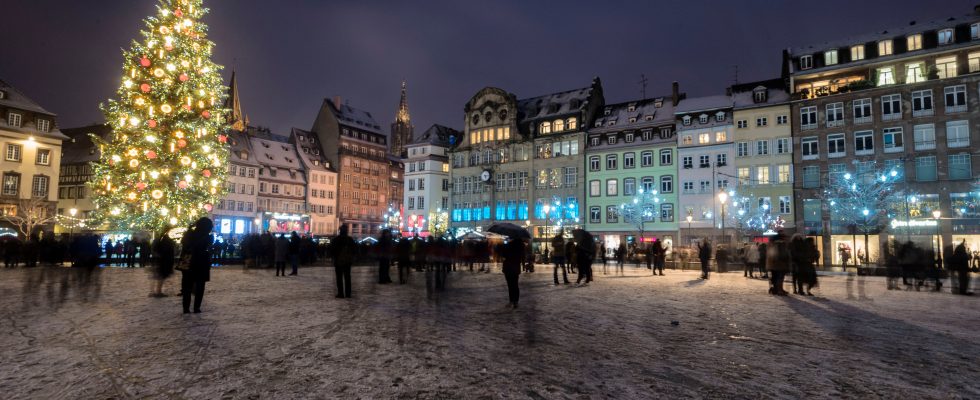Will you have to wander through shopping centers to see snow-covered fir trees? Certainly, their white coats are artificial, the trees are plastic and the music is deafening… But this artificial decor has the merit of being consistent with the Christmas postcard. Unlike our landscapes which the snow has deserted. What if the image of a snowy end of the year was just a myth?
The winter of 2023 was particularly mild and rainy, around 6°C on average across the whole of France. Let’s take the temperatures of December 25: 8°C in Paris and between 2 to 14°C around the Mediterranean. No chance of seeing snow fall on the plains. And in the mountains? You have to climb higher and higher to see them. The star-shaped flakes have been replaced by a fine rain, at the risk of damaging the blow-drys that are still hot.
Snowy Christmases are very rare in France, as December is not the coldest of the winter. “To have snow, you have to have rain and negative temperatures. The lowest temperatures are most often recorded in January and February,” Françoise Vimeux, climatologist and research director at L’Express, explains to L’Express. Research Institute for Development. In note published Wednesday December 20Météo France underlines that between 1950 and 2022, “the presence of snow on the ground at Christmas was observed on average around ten times from the North-East to the Massif Central, much more rarely in the western half of the country with two to four occurrences and exceptionally in regions with a Mediterranean climate.”
Snow melting faster and faster
And even cities accustomed to white coats in winter often find themselves bare. “Compared to previous normals 1981-2010, the average annual number of days of snow (with snow observed) decreased by approximately 2 days in the plains in Bourges (18), Caen (14), Roissy (95), Rouen (76), Lyon (69) and 3 to 4 days in Besançon (25) or Basel-Mulhouse (68)”, lists Météo France. Let’s focus on Besançon (Franche-Comté): the city has not experienced snow at Christmas since 2010. An unprecedented fact since 1949, according to Météo France. Besançon “lost eight days per year on average of snow on the ground between the period 1961-1990 (28 days/year) and 1991-2020 (19.7 days/year)”, according to this same source.
With climate change, the atmosphere is warming and negative temperatures are becoming increasingly rare. Consequences: snow arrives late and melts more quickly. “Snow forms at the rain-snow limit, called the isotherm (the altitude level where the air temperature passes through zero in the free atmosphere). However, with global warming, we observes a rise in this isotherm. This is also what caused devastating floods in the Northern Alps in December. In other words, below 2,500 meters, it was not snow but rain “, underlines Charlène Descollonges, hydrologist and author of Water Fake or Not (Tana Edition).
Beyond being an integral part of the Christmas imagination, snow fulfills several important functions. First of all, it reflects solar radiation, thanks to its white surface, reducing global warming. This is what is called the “aldebo” effect: the lighter a body is, the more reflective it is. Concretely, if the mid-mountains are no longer snow-covered, the heat sets in.
But this is not its only function, as Françoise Vimeux points out: “Snow also stores water. When it melts at the end of spring, it contributes to the level of many watercourses. Without this snow cover, several watercourses will no longer be fed at the start of summer.” For her part, hydrologist Charlène Descollonges compares snow to a “savings account for drought” which will feed mountain rivers. “The latter will experience more droughts, spring and summer, with its disappearance.”
Finally, could the snow disappear completely? Françoise Vimeux answers in the affirmative. “In the plains, if we reach significant degrees of warming, cold waves will be rare and snow events will become more and more exceptional. In the mountains, snow will persist, but at higher altitudes.” Same story with Charlène Descollonges: “All the climate models reported by Météo France show that by 2050, whatever the scenario, we will have a reduction in the duration of snow cover of several weeks with a reduction in the layer of snow.” By then, snow at Christmas may be nothing more than a vague memory.
